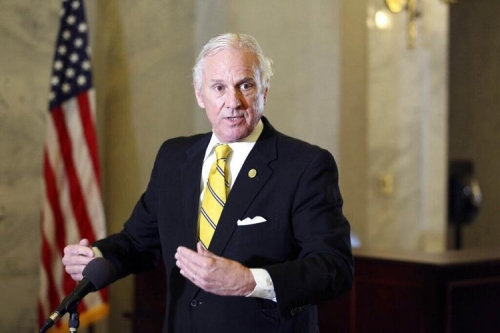McMaster ends federal unemployment benefits to address workforce shortage
PPI President and CEO Ellen Weaver is quoted by Jon Styf in The Center Square discussing federal unemployment payouts. Photograph by Jeffrey Collins of the Associated Press.
(The Center Square) – South Carolina will quit participating in the federal unemployment pandemic assistance programs at the end of next month.
Gov. Henry McMaster announced he directed the South Carolina Department of Employment and Workforce (DEW) to stop the state’s participation in all federal pandemic-related unemployment benefit programs in order to address workforce shortages, effective June 30.
“South Carolina’s businesses have borne the brunt of the financial impact of the COVID-19 pandemic,” McMaster wrote Thursday in a letter to DEW Executive Director Dan Ellzey. “Those businesses that have survived – both large and small, and including those in the hospitality, tourism, manufacturing, and healthcare sectors – now face an unprecedented labor shortage.”
Ben Homeyer, the National Federation of Independent Business’ South Carolina state director, said the No. 1 issue his members have is finding employees. He said South Carolina’s small businesses are a microcosm of the national trends and numbers in terms of job openings and the current inability to fill them.
“Hospitality is a big part, but it’s also retailers and small manufacturers. I’ve talked to large scale manufacturers that have the same issues,” Homeyer said. “It’s really across all industries. It’s everywhere, and it’s widespread.”
An NFIB report showed 44% of small business owners nationwide reported not being able to fill job openings in April. That figure is 22 percentage points higher than the historical average and 2 percentage points higher than March.
“At the current time, there are 81,684 open positions in the state of South Carolina. The hotel and food service industries have employee shortages that threaten their sustainability. However, no area of the economy has been spared from the pain of a labor shortage,” Ellzey said. “While the federal funds supported our unemployed workers during the peak of COVID-19, we fully agree that reemployment is the best recovery plan for South Carolinians and the economic health of the state. Last week’s initial claims numbers were the lowest since the pandemic began, and employers around the state are eager to hire and anxious to get South Carolina back to business.”
Sen. Mia McLeod, D-Columbia, believes McMaster is making the move of denying South Carolinians the $300 weekly pandemic relief unemployment funds for political reasons.
“He doesn’t care that 100,000 people won’t be able to keep a roof over their heads or food on their tables,” McLeod tweeted. “He just hopes it’ll help him get re-elected.”
The federal programs South Carolina no longer will be a part of include Pandemic Unemployment Assistance (PUA), Pandemic Emergency Unemployment Compensation (PEUC), Federal Pandemic Unemployment Compensation (FPUC), Mixed Earners Unemployment Compensation (MEUC), Emergency Unemployment Relief for Governmental Entities and Nonprofit Organizations and Temporary Federal Funding of the First Week of Compensable Regular Unemployment for States with No Waiting Week.
“These federal entitlements pose a clear and present danger to the health of our State’s businesses and to our economy,” McMaster wrote. “Since the Biden administration and Congress appear to have little to no comprehension of the damage being done and no appetite to terminate the federal payments, the state of South Carolina must take action.”
Homeyer believes the timing of the decision works well because it gives potential employees time to prepare and it gives employers more incentive to get jobs posted promptly.
“Federal payouts that incentivize people not to work are hurting South Carolina’s economy, local businesses, and ultimately the dignity of the very people they profess to help,” Palmetto Promise Institute President and CEO Ellen Weaver said. “With over 80,000 jobs now open around the state, Governor McMaster has made the right call. Getting South Carolinians back to work is the best recovery plan we have.”






